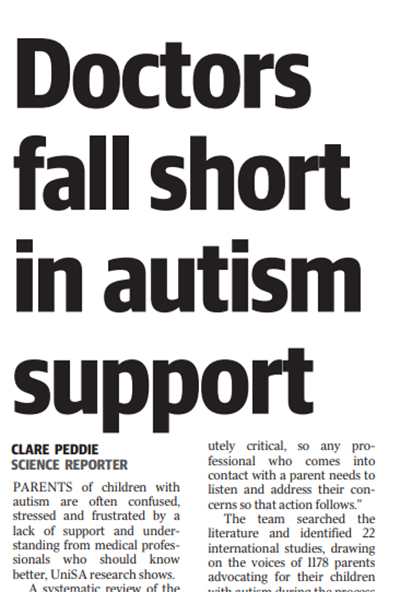Parents left in the cold when it comes to kids with autism
By Annabel Mansfield
 HEALTH
HEALTH> Genetic link between young mums and kids with ADHD
First-line health professionals must vastly improve their communication and engagement with parents if they are to help address the growing prevalence of autism among children, say researchers from UniSA.
 The Advertiser 22 October 2019
The Advertiser 22 October 2019Undertaking a meta-synthesis of 22 international studies, researchers consolidated the voices of 1178 parents advocating for their children with autism, finding that parents feel ignored and dismissed by medical practitioners as they navigate initial concerns for their child, further investigations, and finally, a formal diagnosis of autism.
Researchers say that medical practitioners need to adopt a family-focused approach to ensure that parents’ concerns, perspectives and observations are taken seriously so that their child has appropriate and timely access to early intervention services.
Autism spectrum disorder (ASD) is a persistent developmental disorder characterised by social difficulties, restricted or repetitive patterns of behaviour, and impaired communication skills. The symptoms can range from mild to severe, with early signs often evident from early childhood.
Autism is one of the most prevalent developmental conditions among children, with one in 70 people in Australia on the spectrum, an estimated 40 per cent increase over the past four years. Internationally, statistics are higher with one in 59 children on the spectrum.
UniSA lead researcher, Dr Kobie Boshoff, says the parent advocacy role is critical and must be taken more seriously by medical practitioners.
“Parents are natural advocates for their child, making them an invaluable source of information when it comes to complex diagnoses for invisible disabilities like autism,” Dr Boshoff says.
“Yet parents are increasingly finding the diagnosis process overly stressful and complicated.
“In this study, parents commonly reported their concerns for their child were not being heard or taken seriously by medical professionals. They said they felt confused, stressed and frustrated at the lack of support and understanding.
“They also reported lengthy delays in receiving a diagnosis for their child, as well as a variety of unsatisfactory explanations as alternatives to autism. As access to early intervention services is essential for improving the development outcomes of children with autism, this too is unacceptable.”
Dr Boshoff says first-line medical professionals and service providers must recognise both the role of parents as advocates for their child, and the importance of the parent-practitioner role, which can significantly impact future relationships with other professionals.
She says to build trust, medical practitioners must reassess the way they talk and engage with parents.
“First-line health professionals and diagnostic services must ensure emotional support is provided to parents throughout the diagnosis process, engaging parents as partners and taking their concerns seriously,” Dr Boshoff says.
“Autism spectrum disorder is a lifelong developmental condition. A positive experience in the early stages of diagnosis can deliver better relationships with future professionals, and most importantly, secure better outcomes for the children.”
Genetic link between young mums and kids with ADHD
Young mothers have a greater chance of having a child with attention deficit hyperactivity disorder (ADHD) according to new research from UniSA.
Published in Nature’s Scientific Reports, the research explored the genetic relationship between female reproductive traits and key psychiatric disorders, finding that the genetic risk of ADHD in children was strongly associated with early maternal age at first birth, particular for women younger than 20.
In Australia, ADHD affects one in 20 people. ADHD is a complex neurodevelopmental disorder which impacts a person’s ability to exert age-appropriate self-control. Characterised by persistent patterns of inattentive, impulsive, and sometimes hyperactive behaviour, individuals find it hard to focus, concentrate, and regulate their emotions.
Using genetic data of 220,685 women via the UK Biobank, the study examined genetic correlations between five female reproductive traits (age at first birth, age at first sexual intercourse, age at first occurrence of menstruation, age at menopause, and number of live births) and six common psychiatric disorders (ADHD, autism, eating disorders, depression, bipolar disorder and schizophrenia).
UniSA researcher Associate Professor Hong Lee says the findings could help improve reproductive health in women and deliver better outcomes for their children.
“Young mums can have it tough, especially as they’re adjusting to becoming a parent while they’re still young themselves,” Assoc Prof Lee says.
“By understanding the links between becoming a mother at a young age and having a child with ADHD, we’re able to better educate and support families sooner.
“The approach is twofold. Firstly, we’re able to inform young women about the high genetic risk of having a child with ADHD if they give birth at a young age. This may caution and prevent them from giving birth at an immature age, which not only improves their reproductive health but also the maternal environment for their baby.
“Secondly, we’re able to educate young mothers about the features of ADHD, such as impulsivity and inattentive behaviours, which may help mothers better recognise the condition in their child and seek treatment sooner than later.
“ADHD is treatable, but early diagnosis and interventions are key to a successful outcome.”
Assoc Prof Lee says while the findings are significant, there are some latent complexities.
“It’s important to understand that while there is a clear genetic link between ADHD and young mothers, this is not necessarily a causal relationship.
“ADHD is a highly heritable disorder which means that a young mother may also have the genes affecting ADHD risk, which is then inherited by her child.
“Knowing a woman has a genetic predisposition for ADHD can be recorded in her family medical history then used to monitor her health and the health of her offspring. In this way, we’re able to ensure both mother and baby receive the support and help they need.”
Other Stories
- UniSA researchers to help NASA monitor health in space
- Great career prospects for UniSA graduates, new government data shows
- Parents left in the cold when it comes to kids with autism
- New multilevel homes become heat traps in summer
- From the Vice Chancellor
- Achievements and Announcements
- World first study with drone cameras able to identify survivors
- Wastewater study pinpoints cities across the world with high drug use
- UniSA ranked top in SA for Education, Law, Business and Economics
- Opportunity for almost 200 UniSA students to study in Indo-Pacific in 2020
- Intensive course empowers women impacted by domestic violence and homelessness
- The magic that happens when a nanoengineer and immunologist collaborate
- UniSA takes reins on world first Invictus Pathways Program for Aussie veterans and first responders
- New Social Enterprise Hub to foster social innovation and entrepreneurship
- New partnership with MIT to underpin data visualisation research
- UniSA Vietnamese law student wins SA’s top honour
- The latest books from UniSA researchers
- UniSA Alumni Awards and UniSA Research Day
- Australia’s drought relief package hits the political spot but misses the bigger point
- Relive the Hawke Centre’s latest events
- Read the latest edition of unisabusiness magazine
- Read the latest edition of enterprise magazine




